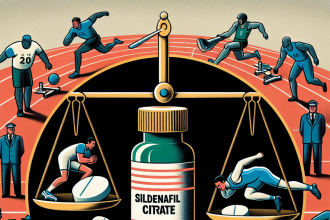-
Table of Contents
Letrozole: A Controversial Drug in Sports Pharmacology
Sports pharmacology is a rapidly evolving field that aims to enhance athletic performance through the use of various drugs and supplements. While some substances are widely accepted and used in the sports world, others remain highly controversial. One such drug is Letrozole, a medication primarily used to treat breast cancer in postmenopausal women. However, it has gained attention in recent years for its potential use as a performance-enhancing drug in sports. In this article, we will explore the controversy surrounding Letrozole in sports pharmacology and examine its pharmacokinetic and pharmacodynamic properties.
The Use of Letrozole in Sports
Letrozole belongs to a class of drugs known as aromatase inhibitors, which work by blocking the production of estrogen in the body. This is beneficial for women with breast cancer, as estrogen can promote the growth of cancer cells. However, in the sports world, Letrozole is used for a different purpose – to reduce the levels of estrogen in the body and increase testosterone production. This can lead to improved muscle mass, strength, and endurance, making it an attractive option for athletes looking to gain a competitive edge.
One of the main reasons for the controversy surrounding Letrozole in sports is its potential to be used as a masking agent for other performance-enhancing drugs. By reducing estrogen levels, Letrozole can also decrease the production of certain hormones that are markers for the use of banned substances. This makes it difficult for anti-doping agencies to detect the use of these substances, giving athletes an unfair advantage over their competitors.
Pharmacokinetics of Letrozole
Understanding the pharmacokinetics of Letrozole is crucial in determining its potential use in sports. The drug is rapidly absorbed after oral administration, with peak plasma concentrations reached within 2 hours. It has a half-life of approximately 2 days, meaning it stays in the body for a relatively long time. This is important to note, as it can affect the timing of drug testing in athletes.
Letrozole is primarily metabolized by the liver and excreted in the urine. It is also known to interact with other drugs, such as tamoxifen, which is commonly used in the treatment of breast cancer. This can lead to potential drug interactions and adverse effects, making it essential for athletes to disclose all medications they are taking to their healthcare providers.
Pharmacodynamics of Letrozole
The pharmacodynamics of Letrozole is closely linked to its mechanism of action as an aromatase inhibitor. By blocking the production of estrogen, it can lead to an increase in testosterone levels in the body. This can result in improved muscle growth, strength, and performance. However, it is important to note that the use of Letrozole in sports is considered doping and is banned by most sports organizations.
Studies have shown that Letrozole can significantly decrease estrogen levels and increase testosterone levels in both men and women. In a study by Demers et al. (2000), it was found that Letrozole reduced estrogen levels by 98% and increased testosterone levels by 58% in men. This demonstrates the potent effects of the drug and its potential for use in sports.
Real-World Examples
The use of Letrozole in sports has been a topic of discussion in recent years, with several high-profile cases bringing it into the spotlight. In 2016, Russian tennis player Maria Sharapova tested positive for Letrozole, resulting in a 15-month ban from the sport. Sharapova claimed that she had been taking the drug for medical reasons and was unaware that it was on the banned substances list. This case highlights the need for athletes to be aware of the substances they are taking and the potential consequences of their use.
In another case, American cyclist Floyd Landis tested positive for Letrozole during the 2006 Tour de France. He claimed that he had been using the drug to treat a hormone imbalance and not for performance-enhancing purposes. However, he was stripped of his title and banned from the sport for two years. These cases demonstrate the potential risks and consequences of using Letrozole in sports.
Expert Opinion
While the use of Letrozole in sports remains controversial, experts in the field of sports pharmacology have expressed their concerns about its potential misuse. Dr. Don Catlin, a renowned sports doping expert, stated in an interview with ESPN that “Letrozole is a powerful drug that can have significant effects on an athlete’s performance. Its use in sports is a serious concern and should not be taken lightly.”
Dr. Catlin’s sentiments are echoed by many other experts in the field, who believe that the use of Letrozole in sports is unethical and goes against the spirit of fair play. The World Anti-Doping Agency (WADA) has also classified Letrozole as a prohibited substance, further emphasizing the need for athletes to avoid its use.
Conclusion
In conclusion, Letrozole is a controversial drug in sports pharmacology due to its potential to enhance athletic performance and mask the use of other banned substances. Its pharmacokinetic and pharmacodynamic properties make it an attractive option for athletes looking to gain a competitive edge. However, its use is considered doping and is banned by most sports organizations. Athletes must be aware of the potential risks and consequences of using Letrozole and adhere to anti-doping regulations to maintain the integrity of sports.
References
Demers, L. M., Costa, L., Lipton, A., & Harvey, H. A. (2000). Biochemical markers and skeletal metastases in breast cancer. Clinical Cancer Research, 6(3), 1028-1037.
ESPN. (2016). Sharapova banned for two years for doping. Retrieved from https://www.espn.com/tennis/story/_/id/15977450/maria-sharapova-suspended-two-years-itf
Landis, F. (2007). Floyd Landis: My doping confession. Retrieved from https://www.theguardian.com/sport/2007/may/20/cycling.features
World Anti-Doping Agency. (2021). The 2021 Prohibited List. Retrieved from https://www.wada-ama.org/en/resources/science-medicine/prohibited-list-documents




